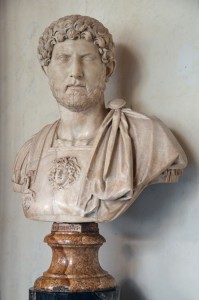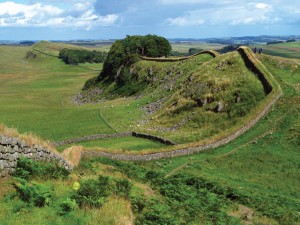Roman Emperor Hadrian
Tuesday, July 10th, 2018July 10, 2018
On July 10, A.D. 138, 1,880 years ago today, the ancient Roman emperor Hadrian died at his villa in the city of Baiae near modern-day Naples, Italy. Hadrian, most famous for the great stone wall that bears his name in northern England, paid great personal attention to the provinces of the Roman Empire, nearly all of which he visited as emperor. He also began the process of organizing Roman law into a uniform code. Hadrian died at age 62, most likely of heart failure.

Bust of Hadrian. Credit: Carole Raddato (licensed under CC BY-SA 2.0)
Hadrian undertook many building projects. The Pantheon, completed during his reign, still stands in Rome. Hadrian fortified parts of the frontier and built a number of Roman walls where no natural territorial boundaries existed. He founded two new cities—Antinoopolis in Egypt and Hadrianople in Thrace (now Edirne, Turkey). He also completed the huge temple of Zeus in Athens, which had been begun in the 500′s B.C.

Hadrian’s Wall, built by the Romans in the A.D. 120′s, protected England from northern raiders. It extended from Solway Firth to the North Sea. Parts of the wall, such as that shown in this photograph, still stand. Credit: © Thinkstock
Hadrian’s given name was Publius Aelius Hadrianus. He was born on Jan. 24, A.D. 76. He came from Italica near modern-day Seville, Spain. Hadrian’s father died during his youth, and Trajan, Hadrian’s cousin, became his guardian. After Trajan became Roman emperor in 98, Hadrian held military and senatorial posts and traveled to the northern and eastern frontiers of the empire. He became emperor after Trajan’s death in 117.
Hadrian was a poet, an amateur architect, and a student of Greek culture. His reign was generally peaceful. He rejected Trajan’s aggressive policies, ending a war with Parthia, a land beyond Rome’s eastern frontiers. To avoid further wars, he returned Parthian territory that Rome had won. The only major conflict occurred in 132, when Jews in Palestine revolted. Hadrian crushed the revolt in 135. He made Jerusalem a Roman colony and forbade Jews to worship there. In 138, Hadrian picked Titus Aurelius Antoninus (Antoninus Pius) to succeed him as emperor.


